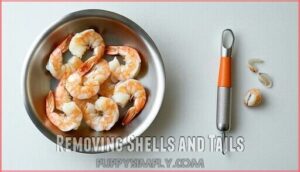This site is supported by our readers. We may earn a commission, at no cost to you, if you purchase through links.
 Shrimp cocktail might seem like a fancy treat for your dog, but it’s not the safest option.
Shrimp cocktail might seem like a fancy treat for your dog, but it’s not the safest option.
While plain, cooked shrimp can be a healthy snack in moderation, the cocktail sauce is a red flag.
It’s loaded with spices, garlic, onion, and high sodium—all harmful to dogs.
Even the shrimp itself could cause issues if it’s fried, seasoned, or served with shells and tails, which are choking hazards.
If your dog accidentally sneaks a bite, watch for signs of allergies or digestive upset.
Curious about safer seafood options or tips on preparing shrimp for dogs? There’s plenty more to explore, including the importance of moderation.
Table Of Contents
- Key Takeaways
- Shrimp Cocktail for Dogs
- Can Dogs Eat Shrimp Cocktail
- Shrimp Nutrition for Dogs
- Feeding Shrimp to Dogs Safely
- Shrimp Cocktail Risks for Dogs
- Healthy Shrimp Alternatives for Dogs
- Frequently Asked Questions (FAQs)
- Is shrimp cocktail safe for dogs?
- What seafood should dogs not eat?
- Are there different types of shrimp that are safe for dogs to eat?
- Are there other foods that should not be fed alongside shrimp?
- What are the signs to look out for if a dog has an allergic reaction to shrimp?
- Are there any risks associated with feeding shrimp to puppies?
- Can shrimp cocktail seasoning harm my dog?
- What should I do if my dog eats raw shrimp?
- Are all shrimp types safe for dogs?
- Can dogs eat shrimp prepared without seasoning?
- Conclusion
Key Takeaways
- Don’t feed your dog shrimp cocktail—the sauce, spices, and seasonings are toxic.
- Plain, cooked shrimp (without shells or tails) can be safe, but keep portions small.
- Watch for allergies or digestive issues when introducing shrimp to your dog.
- Always steam or boil shrimp; avoid frying, seasoning, or raw varieties for your dog’s safety.
Shrimp Cocktail for Dogs
Shrimp cocktail might seem like a fancy treat, but it’s not the best option for your dog.
The sauces, seasonings, and potential allergens can pose serious risks to their health.
Nutritional Benefits of Shrimp
Shrimp serves as a nutrient-packed option for dogs, offering Vitamin B12 for energy and metabolism, niacin benefits for enzyme functions, and phosphorus content to support healthy bones.
The antioxidant boost protects against cell damage, while being a low-fat option perfect for diets.
Including shrimp for dogs, in moderation, adds valuable nutrition. Shrimp benefits dogs by enhancing their overall health.
Fish can also be a great addition to a dog’s diet, as it offers a rich source of protein, providing a rich source of necessary nutrients.
Risks of Feeding Shrimp to Dogs
Feeding shrimp to your dog comes with risks.
Raw shrimp may carry pathogens that harm your dog’s gastrointestinal health.
Shell dangers, like choking or blockages, are serious concerns.
High cholesterol and sodium levels can lead to health problems, especially in large amounts.
Allergic reactions, although rare, may cause vomiting or itchy skin.
Always monitor your dog for shrimp risks.
Safe Preparation Methods
Wondering how to prepare shrimp safely for your pup? Always cook shrimp thoroughly—steaming is ideal—reaching safe cooking temperatures to kill bacteria.
Skip seasonings like garlic and onion, toxic to dogs. Remove shells and tails to avoid choking hazards.
Keep serving sizes small. Watch for allergen awareness; observe reactions closely.
Store cooked shrimp properly to maintain freshness and safety. Many owners utilize a dog shrimp steamer for best results, ensuring safe cooking temperatures.
Can Dogs Eat Shrimp Cocktail
While shrimp can be a healthy treat for dogs, shrimp cocktail isn’t safe.
The main issue lies with the cocktail sauce—it’s a no-go for dogs. Ingredients like garlic, onions, and spices in the sauce can be toxic to your pup.
Plus, the shrimp itself might carry risks depending on its source and preparation. Raw or fried shrimp is harmful, and even properly cooked shrimp requires care.
Portion sizes should match your dog’s breed sensitivity; small amounts are key. Can dogs eat shrimp safely? Yes—if it’s plain, steamed, and served appropriately.
But shrimp cocktail? That’s best left for people. Cooked shrimp can offer glucosamine for joint health. Always prioritize your dog’s health by avoiding risky foods and consulting your vet when trying something new!
Shrimp Nutrition for Dogs
Shrimp is packed with protein, vitamins, and minerals that can support your dog’s overall health when given in moderation.
It’s a low-calorie treat that also provides beneficial nutrients like omega-3 fatty acids and antioxidants.
Protein and Vitamin Content
Protein-packed and loaded with essential nutrients, shrimp offers great benefits for your dog’s nutrition.
It’s a source of B12, niacin, and vitamin D, all essential for health.
These nutrients aid their metabolism and energy.
- B12 Benefits: Boosts metabolism and supports the gut.
- Niacin Function: Improves circulation and enzyme activity.
- Essential Amino Acids: Promote muscle and tissue health.
Mineral and Antioxidant Content
You know, shrimp is a powerhouse of dog nutrition.
Its rich minerals like phosphorus and selenium support bones and overall health.
Antioxidants in shrimp combat free radicals, boosting cell protection and brain function.
Let’s unpack key benefits:
| Mineral/Nutrient | Benefit | Role in Dogs |
|---|---|---|
| Selenium Benefits | Cellular repair | Fights oxidative stress |
| Phosphorus Importance | Bone strength | Prevents bone disorders |
| Antioxidant Types | Free radical defense | Supports brain health |
| Zinc | Immune system support | Boosts healing |
| Magnesium | Energy production | Aids muscle health |
Omega-3 Fatty Acid Benefits
Omega-3 fatty acids in shrimp offer fantastic perks for your dog.
They boost heart health, improve joint support, and even aid cognitive function as dogs age.
Skin health also gets a lift, keeping coats shiny and itch-free.
Plus, these fats strengthen immune response, helping your pup stay resilient, and it’s clear: shrimp’s omega-3s are great for dog health benefits!
Feeding Shrimp to Dogs Safely
Feeding shrimp to your dog safely means taking a few important steps to avoid health risks.
You’ll need to cook it thoroughly, remove the shells and tails, and offer small portions in moderation.
Removing Shells and Tails
When you let your dog eat shrimp, always remove the shells and tails first.
They’re a choking hazard, especially for small breeds, and can cause intestinal blockage or irritation.
Safe removal guarantees no sharp bits that might harm your pup.
Plus, shrimp shells aren’t easily digestible.
Consider using a tool for easier removal to keep things simple—stick to clean, shell-free shrimp to avoid unnecessary risks.
Cooking Methods for Dogs
Cooking shrimp for dogs safely means sticking to methods like steaming or boiling.
This removes harmful pathogens while keeping nutrients intact. Avoid frying or adding unsafe seasonings like garlic.
Use the best equipment, like a steamer, to cook evenly. Always cook to safe temperatures, and remember: plain, fully cooked shrimp helps prevent risks while keeping your dog healthy.
Some dogs may experience shrimp allergy symptoms, so monitor them closely.
Portion Control and Moderation
When feeding shrimp to your dog, less is more. Overindulging can affect their diet and health. Stick to small portions—just a few shrimp pieces, depending on size.
- Daily Limits: Shrimp treats shouldn’t exceed 10% of their daily calories.
- Treat Percentage: Balance shrimp with regular dog food.
- Breed Sensitivity: Smaller breeds need smaller servings.
- Veterinary Guidance: Check if shrimp suits your dog’s nutrition plan.
Shrimp Cocktail Risks for Dogs
Feeding your dog shrimp cocktail isn’t a safe treat option due to potential risks.
It can contain harmful ingredients like seasonings, high sodium, and raw shrimp, which may cause serious health issues.
Choking Hazards and Obstructions
Shrimp shells and tails aren’t just crunchy—they’re risky. If swallowed whole, they can cause choking hazards and obstructions, especially in small breeds.
These sharp, brittle parts may damage intestinal linings, leading to discomfort or worse. To prioritize dog safety, always remove shells and tails before feeding. Watch for emergency signs like coughing, gagging, or intestinal blockage symptoms.
| Risk | Cause | Symptoms | Dog Size at Higher Risk | Prevention |
|---|---|---|---|---|
| Choking | Whole shrimp shell | Coughing, gagging | Small breeds | Remove shell and tail |
| Tail Dangers | Sharp tail fragments | Vomiting, choking | All sizes, particularly small | Cut into small pieces |
| Intestinal Blockage | Swallowing obstructions | Lethargy, loss of appetite | Smaller dogs | Remove inedible parts |
| Breed Sensitivity | Anatomical fragility | Discomfort, diarrhea | Toy breeds like Chihuahuas | Serve tiny bites carefully |
| Dog Health Concerns | Improperly chewed food | Emergency vet visits | All dogs | Monitor eating habits closely |
Allergic Reactions and Symptoms
Some dogs experience allergic reactions to shrimp, like vomiting, diarrhea, or itchy skin reactions.
Rarely, severe symptoms such as swelling, trouble breathing, or anaphylactic shock may occur.
Puppies and breeds with sensitive stomachs are more prone to food intolerance.
Always watch for signs of dog allergies or digestive issues and consult your vet when introducing shellfish like shrimp.
High Cholesterol and Sodium Content
Keep an eye on cholesterol concerns when feeding shrimp to your dog.
Their cholesterol levels can spike since shrimp has around 190 mg per 100 g.
Sodium risks are another red flag, especially for heart health, hypertension issues, or kidney impact.
Always limit shrimp risks for dogs by sticking to plain, steamed options and monitoring your dog’s diet with care.
Healthy Shrimp Alternatives for Dogs
If shrimp isn’t the right choice for your dog, there are plenty of safer, nutritious options to explore.
From cooked fish to dog-approved treats, you can still offer tasty alternatives without the risks.
Cooked and Steamed Shrimp Options
When preparing shrimp for dogs, steaming benefits outweigh other cooking methods.
It preserves nutrients essential for dog health, like Vitamin B12 and omega-3s, without adding unhealthy fats.
Steamed shrimp also makes safe serving easier—no messy oils or risky seasonings.
Stick to small portion sizes, like a couple of shrimp, ensuring shrimp is good for dogs without overloading their diet, which is a key factor for their overall health.
Shrimp-Free Dog Treats and Recipes
If shrimp isn’t safe for your pup, there are plenty of healthy dog treats to explore.
Try alternative proteins like chicken or salmon. Vegetable options such as sweet potato treats are always a winner.
Fruit-based treats, like peanut butter banana pops, add variety. Homemade dog treats can be a healthy option.
Homemade biscuits and grain-free recipes keep your dog’s diet fresh and full of safe foods for dogs.
Consultation With a Veterinarian
A veterinarian’s advice guarantees shrimp fits into your dog’s diet safely.
They’ll help with dietary integration, allergy screening, and portion guidance based on breed considerations.
Health monitoring is key since shrimp can affect dog health.
If your dog’s allergic to shrimp, your vet can suggest alternatives.
Remember that omega-3 fatty acids from other sources may be beneficial.
Always prioritize professional input for balanced dog nutrition and to avoid unexpected issues.
Frequently Asked Questions (FAQs)
Is shrimp cocktail safe for dogs?
Don’t bite off more than you can chew—shrimp cocktail isn’t safe for dogs.
The sauces often contain garlic, onions, or spices that are toxic.
Stick to plain, cooked shrimp without seasoning for your pup.
What seafood should dogs not eat?
Avoid feeding dogs seafood like raw fish, shellfish, or smoked salmon, as they can carry harmful bacteria, toxins, or high salt levels.
Steer clear of seasoned or fried seafood, as these can upset their stomach.
Are there different types of shrimp that are safe for dogs to eat?
Not all shrimp are created equal, but most types, like tiger, white, or pink shrimp, are safe for dogs if cooked plain and properly cleaned.
Always ditch shells, tails, and seasonings for safety.
Are there other foods that should not be fed alongside shrimp?
You shouldn’t pair shrimp with foods like garlic, onions, or heavy seasonings—these can harm dogs.
Stick to plain, cooked shrimp, and avoid sauces, butter, or oils to keep your dog’s tummy safe and happy.
What are the signs to look out for if a dog has an allergic reaction to shrimp?
Imagine this scenario: your dog starts itching nonstop, sneezing, or showing hives.
Maybe there’s vomiting, diarrhea, or swelling around their face.
In rare cases, watch for difficulty breathing—always act fast if these symptoms appear, as it can indicate a serious issue requiring immediate attention, such as difficulty breathing.
Are there any risks associated with feeding shrimp to puppies?
Feeding shrimp to puppies carries risks like allergies, digestive issues, or choking on shells.
Puppies are more sensitive, so introduce shrimp slowly, fully cooked, and without shells.
Always consult your vet before offering shrimp.
Can shrimp cocktail seasoning harm my dog?
Shrimp cocktail seasoning isn’t safe for dogs.
Ingredients like garlic, onion, salt, and spices can harm them, potentially causing upset stomachs or worse.
Always stick to plain, fully cooked shrimp without any added seasoning.
What should I do if my dog eats raw shrimp?
If your dog eats raw shrimp, watch for signs like vomiting, diarrhea, or lethargy.
Raw shrimp can carry harmful bacteria.
Contact your vet immediately to prevent problems from escalating—they’ll know what’s best for your pup.
Are all shrimp types safe for dogs?
Not all shrimp types are safe for dogs.
Stick to plain, cooked shrimp without shells or seasonings. Avoid fried, breaded, or processed varieties like coconut shrimp.
Always consult your vet before introducing shrimp to your dog.
Can dogs eat shrimp prepared without seasoning?
Yes, as long as it’s cooked, deveined, and shell-free, shrimp without seasoning can be safe for dogs.
Just keep portions small—too much can upset their stomach.
Always watch for any allergic reactions.
Conclusion
It might seem tempting to share shrimp cocktail with your dog, but it’s not the safest choice.
While plain, cooked shrimp can be a healthy treat, cocktail sauce and seasonings are harmful.
Keep shrimp plain, remove shells and tails, and feed it in moderation to avoid choking, allergies, or stomach upset.
Always skip the cocktail! If you’re still wondering, “Can dogs eat shrimp cocktail?” Remember, safer seafood options and proper preparation are always better for your pup.















